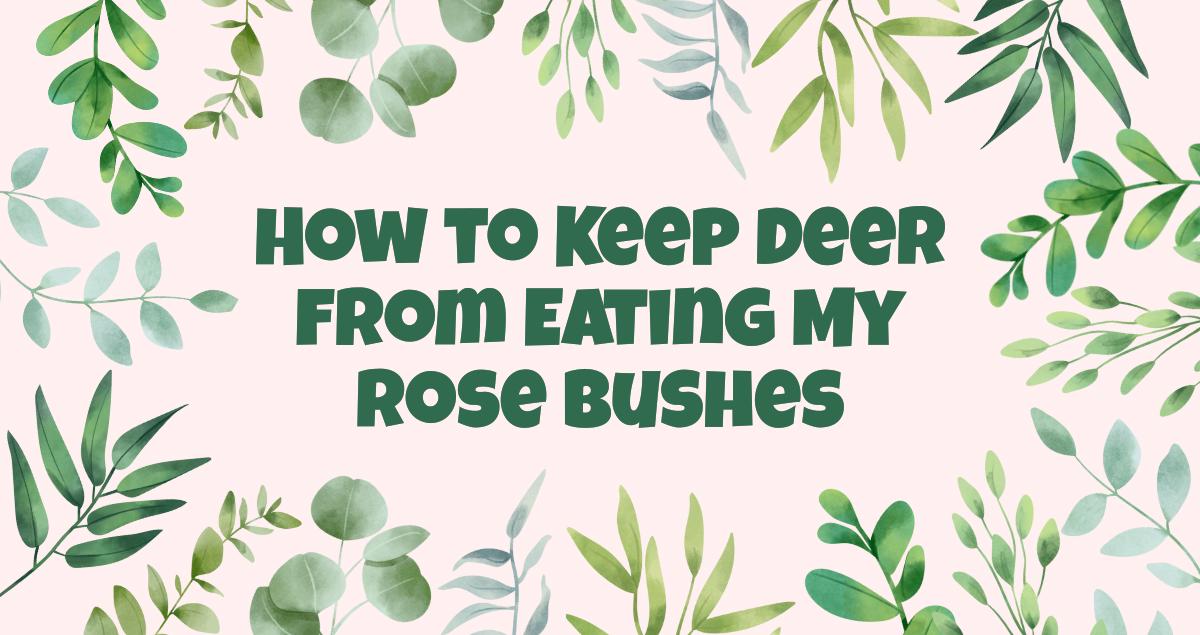Understanding the Problem: Deer Eating Rose Bushes
Deer eating rose bushes can be a frustrating problem for gardeners. These beautiful and delicate plants require care and attention to thrive, and the damage caused by deer can be disheartening. Understanding the behavior of deer and the reasons why they are attracted to rose bushes is the first step in finding effective solutions.
Table of Content
How to Keep Deer from Eating My Rose Bushes
To keep deer from eating your rose bushes, try using physical barriers like fences or netting, planting deer-resistant plants nearby, using deer repellents or deterrents such as sprays or motion-activated devices, and creating a less attractive environment by removing fallen fruit and providing alternative food sources.
Identifying the Culprit: Deer
Deer are herbivores and are known to feed on a variety of plants, including rose bushes. They are attracted to the tender leaves, buds, and flowers of roses, making them a prime target for these graceful creatures. Deer are particularly active during dawn and dusk, and their keen sense of smell and ability to jump high fences make it challenging to keep them away from your precious rose bushes.
The Importance of Protecting Rose Bushes
Protecting rose bushes from deer damage is essential to maintain their health and beauty. Deer feeding can lead to stripped leaves, broken stems, and even the complete destruction of the plant. This not only affects the aesthetic appeal of your garden but also hampers the growth and blooming of your roses. By implementing effective strategies to deter deer, you can ensure the longevity and vitality of your beloved rose bushes.
Effective Strategies to Keep Deer Away from Rose Bushes
There are several methods and techniques that can be employed to deter deer from eating your rose bushes. These strategies range from natural repellents to physical barriers and scare tactics.
Natural Repellents
One approach is to use natural substances and plants that act as deer repellents. Some examples include spraying a mixture of garlic and water on the rose bushes or planting strong-smelling herbs like lavender or sage nearby. These scents can help mask the enticing aroma of roses and deter deer from approaching.
Physical Barriers
Installing physical barriers is another effective method to protect rose bushes from deer. Fences, netting, and cages can be used to create a physical barrier that prevents deer from accessing the plants. It is important to ensure that the barriers are tall enough and properly secured to prevent deer from jumping over or pushing through.
Scare Tactics
Scare tactics can also be employed to startle and deter deer from approaching rose bushes. This can include using motion-activated sprinklers that spray water when deer come near, or hanging shiny objects like aluminum foil or wind chimes to create movement and noise. These sudden and unexpected stimuli can discourage deer from venturing into your garden.
Deer-Resistant Plants
Another strategy is to plant deer-resistant plants alongside your rose bushes. By creating a garden with a variety of plants that deer find less appealing, you can reduce the chances of them feeding on your roses. Some examples of deer-resistant plants include daffodils, marigolds, and lavender.
Additional Tips for Deer Management in Gardens
In addition to protecting your rose bushes, there are other measures you can take to manage deer in your garden and prevent damage beyond just the roses.
Proper Garden Maintenance
Maintaining a well-kept garden is important to reduce deer attraction and potential damage. This includes removing fallen fruits, keeping the garden tidy, and regularly trimming plants to minimize hiding spots for deer.
Alternative Feeding Areas
Creating alternative feeding areas for deer can help redirect their attention away from your rose bushes. This can be done by setting up a designated feeding station with deer-friendly plants or by providing food sources such as corn or hay in a different part of your property.
Professional Assistance
If the deer problem persists or becomes overwhelming, it may be beneficial to seek professional help or consult with local wildlife management agencies. They can provide expert advice on deer management techniques specific to your area and situation.
Conclusion
In conclusion, protecting your rose bushes from deer damage is crucial to maintain their health and beauty. By understanding the behavior of deer and implementing effective strategies such as natural repellents, physical barriers, scare tactics, and planting deer-resistant plants, you can keep these graceful creatures away from your precious roses. Additionally, proper garden maintenance and creating alternative feeding areas can further aid in managing deer in your garden. By taking proactive measures, you can enjoy the beauty of your rose bushes without the frustration of deer feeding.
Frequently Asked Questions
How do you protect rose bushes from deer?
To protect rose bushes from deer, you can use physical barriers such as fencing or netting around the plants. Another option is to use deer repellents, either homemade or commercial ones, which can be sprayed on the plants to deter deer from eating them. Additionally, planting deer-resistant plants around your rose bushes can help keep the deer away.
Does Irish Spring soap repel deer?
Yes, Irish Spring soap is known to repel deer. The strong scent of the soap is unpleasant to deer, and they tend to avoid areas where it is present. Simply hang bars of Irish Spring soap near your rose bushes or grate the soap and scatter it around the plants to keep deer at bay.
What is a natural deer repellent for plants?
There are several natural deer repellents that can help protect your plants. Some options include using a mixture of garlic and water, hot pepper spray, or a solution made from rotten eggs and water. These repellents can be sprayed directly on the plants and their strong scents or tastes deter deer from feeding on them.
How do you repel deer naturally?
To repel deer naturally, you can try various methods. Planting deer-resistant plants, using strong-smelling plants like lavender or mint as a deterrent, or installing motion-activated sprinklers can help keep deer away. Additionally, using natural deer repellents such as garlic or hot pepper sprays can be effective in deterring deer from your garden.
Are there any plants that deer won't eat?
Yes, there are several plants that deer tend to avoid due to their taste or scent. Some examples of deer-resistant plants include lavender, yarrow, daffodils, marigolds, and sage. Planting these alongside your rose bushes can help protect them from deer browsing.
Can I use human hair to deter deer?
Yes, using human hair can help deter deer. The strong scent of human hair can mimic the presence of humans and make deer wary. You can collect hair clippings from a salon or barber shop and spread them around your rose bushes to discourage deer from approaching.
Do deer eat roses in the winter?
Deer are less likely to eat roses in the winter as their food sources become scarce. However, if other preferred food options are limited, deer may resort to feeding on rose bushes. It's still important to take preventive measures to protect your roses, especially if you live in an area with a high deer population.

